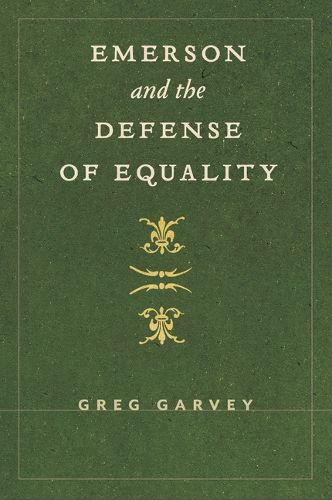Readings Newsletter
Become a Readings Member to make your shopping experience even easier.
Sign in or sign up for free!
You’re not far away from qualifying for FREE standard shipping within Australia
You’ve qualified for FREE standard shipping within Australia
The cart is loading…






Arguing for equality as the necessary foundation of liberty
During Ralph Waldo Emerson's lifetime, the idea of universal human equality was under intensive assault. Repeatedly - in contexts ranging from slavery, to marriage, to politics and workers' rights - Americans of the time were being told that equality was an obsolete ideal and that the future would belong to those who accepted the hard truth that liberty lies not in egalitarian values but in hierarchies of domination and submission. Greg Garvey's Emerson and the Defense of Equality focuses on Emerson as a real-time defender of equality during the antebellum culture wars.
In contrast to studies that treat individual liberty as Emerson's primary concern, Garvey argues that Emerson's works define a broad and sustained defense of equality as the necessary foundation of liberty. When read as part of a debate about equality, Emerson's Nature is a treatise on individuality and the common weal his anti-slavery speeches and English Traits advance evolutionary theories to rebut polygenesist arguments for white supremacy the essays 'Love' and 'Domestic Life' challenge gender spheres and explore equality in marriage, friendship, and citizenship. As Emerson speculates on the future, 'Politics' and 'The Young American' anticipate a 'beneficent socialism' in which human rights will always have priority over property rights. In his career-long effort to defend a threatened ideal, Emerson develops an aspirational vision of society that understands equality to be a fundamental aspect of liberty.
$9.00 standard shipping within Australia
FREE standard shipping within Australia for orders over $100.00
Express & International shipping calculated at checkout
Stock availability can be subject to change without notice. We recommend calling the shop or contacting our online team to check availability of low stock items. Please see our Shopping Online page for more details.
Arguing for equality as the necessary foundation of liberty
During Ralph Waldo Emerson's lifetime, the idea of universal human equality was under intensive assault. Repeatedly - in contexts ranging from slavery, to marriage, to politics and workers' rights - Americans of the time were being told that equality was an obsolete ideal and that the future would belong to those who accepted the hard truth that liberty lies not in egalitarian values but in hierarchies of domination and submission. Greg Garvey's Emerson and the Defense of Equality focuses on Emerson as a real-time defender of equality during the antebellum culture wars.
In contrast to studies that treat individual liberty as Emerson's primary concern, Garvey argues that Emerson's works define a broad and sustained defense of equality as the necessary foundation of liberty. When read as part of a debate about equality, Emerson's Nature is a treatise on individuality and the common weal his anti-slavery speeches and English Traits advance evolutionary theories to rebut polygenesist arguments for white supremacy the essays 'Love' and 'Domestic Life' challenge gender spheres and explore equality in marriage, friendship, and citizenship. As Emerson speculates on the future, 'Politics' and 'The Young American' anticipate a 'beneficent socialism' in which human rights will always have priority over property rights. In his career-long effort to defend a threatened ideal, Emerson develops an aspirational vision of society that understands equality to be a fundamental aspect of liberty.